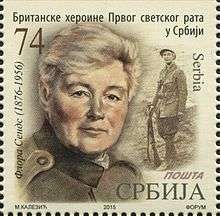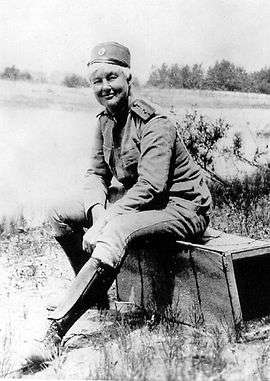Flora Sandes
| Flora Sandes | |
|---|---|
|
Sandes in Serbian Army uniform, ca. 1918 | |
| Born |
22 January 1876 Nether Poppleton, Yorkshire, England |
| Died |
24 November 1956 (aged 80) Suffolk, England |
| Allegiance | Kingdom of Serbia |
| Service/branch | Serbian Army |
| Years of service | 1914–1922 |
| Rank | Captain |
| Battles/wars | |
| Awards | Order of the Star of Karađorđe |
Flora Sandes (22 January 1876 – 24 November 1956) was a British woman who served as an officer of the Royal Serbian Army in World War I. She was the only British woman officially to serve as a soldier in WWI. Initially a St. John Ambulance volunteer, she travelled to the Kingdom of Serbia, where, in the confusion of war, she was formally enrolled in the Serbian army. She was subsequently promoted to the rank of Sergeant major, and, after the war, to Captain.[1] She was decorated with seven medals.[2]
Biography
Early life
Flora Sandes was born on 22 January 1876 in Nether Poppleton, Yorkshire, the youngest daughter of an Irish family. Her father was Samuel Dickson Sandes (1822–1914), the former rector of Whitchurch, County Cork, and her mother was Sophia Julia (née Besnard).[3][4] When she was nine years old, the family moved to Marlesford, Suffolk; and later to Thornton Heath, near Croydon, Surrey.[3][5][6] As a child she was educated by governesses.[4] She enjoyed riding and shooting and said that she wished she had been born a boy.[7] She learned to drive, and drove an old French racing car.[7] She took a job as a secretary.[7] In her spare time Sandes trained with the First Aid Nursing Yeomanry (FANY), founded in 1907, as an all-women mounted paramilitary organisation, learning first aid, horsemanship, signalling and drill. She left the FANY in 1910 joining another renegade FANY, Mabel St Clair Stobart, in the formation of the Women's Sick & Wounded Convoy. The Convoy saw service in Serbia and Bulgaria in 1912 during the First Balkan War. At the outbreak of the First World War in 1914 she volunteered to become a nurse, but was rejected due to a lack of qualifications.[8]
Military career
Sandes nonetheless joined a St. John Ambulance unit raised by American nurse Mabel Grouitch, and on 12 August 1914 left England for Serbia with a group of 36 women to try to aid the humanitarian crises there.[3][7][9] They arrived at the town of Kragujevac which was the base for the Serbian forces fighting against the Austro-Hungarian offensive.[10] Sandes joined the Serbian Red Cross and worked in an ambulance for the Second Infantry Regiment of the Serbian Army.[3] During the difficult retreat to the sea through Albania, Sandes was separated from her unit and, for her own safety (namely to get food rations), enrolled as a soldier with a Serbian regiment. She quickly advanced to the rank of Corporal.[7] In 1916, during the Serbian advance on Bitola (Monastir), Sandes was seriously wounded by a grenade in hand to hand combat.[7] She subsequently received the highest decoration of the Serbian Military, the Order of the Karađorđe's Star.[11] At the same time, she was promoted to the rank of Sergeant major.[9]
Also in 1916, Sandes published her autobiography, An English Woman-Sergeant in the Serbian Army, based on her letters and diaries. She used this account to help her raise funds for the Serbian Army.[12] With Evelina Haverfield she founded the Hon. Evelina Haverfield's and Sergt-Major Flora Sandes' Fund for Promoting Comforts for Serbian Soldiers and Prisoners.[13] Unable to continue fighting due to her injury, she spent the remainder of the war running a hospital.[14] At the end of the war she was commissioned as an officer (the first woman to be commissioned), and was finally demobilised in October 1922.[4][11]
Later life
In May 1927, Sandes married Yuri Yudenitch, a fellow officer and former White Army general.[5] The couple lived for a time in France, but afterwards returned to Serbia (which by this date had become part of the Kingdom of Yugoslavia), and settled in Belgrade. Among other jobs, Sandes drove Belgrade's first taxicab. Also in 1927, she published a second autobiography. She lectured extensively on her wartime experiences in the United Kingdom, Australia, New Zealand, France, Canada and the United States. She wore her military uniform while delivering her lectures.[15]
When Germany launched its attack on Yugoslavia in April 1941, Sandes and Yudenitch were recalled to military service, but the invasion was over before they could take up any military duties. They were briefly interned by the Germans, before being released on parole.[11] Yudenitch fell ill, was removed to hospital, and died there in September 1941.[4]
Sandes subsequently returned to England. She spent the last years of her life in Suffolk, where she died in Ipswich and West Suffolk Hospital on 24 November 1956.[4]
In 2009 a street in Belgrade was named after her.[16]
In popular culture

- Our Englishwoman, a television film based on the biography of Flora Sandes and directed by Slobodan Radovitch, was produced in 1997 by the Serbian broadcasting service RTS.[17][18]
- There is a pub called "The Flora Sandes" in her honour in Thornton Heath.
- The last track of the album England Green and England Grey by Reg Meuross is The Ballad of Flora Sandes. It is an interpretation of her life.
See also
- Milunka Savić
- Olive Kelso King
- Ecaterina Teodoroiu
- Maria Bochkareva
- Women in the military
- Emancipation of women
Bibliography
Autobiographies
- Sandes, Flora (1916). An English Woman-Sergeant in the Serbian Army. London: Hodder & Stoughton.
- Sandes, Flora (1927). The Autobiography of a Woman Soldier: A Brief Record of Adventure with the Serbian Army 1916–1919. London: H.F. & G. Witherby.
Other sources
- Anon. (1 December 1956). "Obituary: Miss Flora Sandes: Combatant in Serbian Army". The Times. London. p. 8. (subscription required)
- Burgess, Alan (1963). The Lovely Sergeant. London: Heinemann. (This work is based on Sandes' two autobiographies and other historical sources, but also includes imaginative dialogue and passages.)
- Lee, J. (2006). "A Nurse and a Soldier: Gender, Class and National Identity in the First World War Adventures of Grace McDougall and Flora Sandes". Women's History Review. 15 (1): 83–103. doi:10.1080/09612020500440903.
- MacMahon, Bryan (2005–2006). "Captain Flora Sandes of the Serbian Army". Irish Sword. 25: 419–436.
- Miller, Louise (2012). A Fine Brother: The Life of Captain Flora Sandes. Richmond, Surrey: Alma Books. ISBN 9781846881848.
- Wheelwright, Julie (1989). "Flora Sandes: Military Maid". History Today. 39 (3): 42–48.
- Wheelwright, Julie (1989). Amazons and Military Maids: women who dressed as men in the pursuit of life, liberty and happiness. Pandora. ISBN 0-04-440356-9.
- Wheelwright, Julie (2004). "Yudenitch [Yudenich], Flora Sandes (1876–1956)". Oxford Dictionary of National Biography (online ed.). Oxford University Press. doi:10.1093/ref:odnb/49662. (subscription required)
References
- ↑ Alison Fell (27 October 2014). "Viewpoint: Why are so few WW1 heroines remembered?". BBC News. Retrieved 27 October 2014.
- ↑ Medals of Flora Sandes. velikirat.com
- 1 2 3 4 Taylor & Francis Group (2003). A Historical Dictionary of British Women. Routledge. p. 383. ISBN 1-85743-228-2.
- 1 2 3 4 5 Wheelwright, Julie (2004). "Yudenitch, Flora Sandes (1876–1956)". Oxford Dictionary of National Biography. Oxford University Press. doi:10.1093/ref:odnb/49662.
- 1 2 Wheelwright, Julie (1989). Amazons and Military Maids. Pandora. ISBN 0-04-440356-9.
- ↑ Twinch, Carol. The Little Book of Suffolk. Breedon Books. ISBN 1-85983-587-2.
- 1 2 3 4 5 6 Hazen, Walter A. (2006). Everyday Life. Good Year Books. p. 61. ISBN 1-59647-074-7.
- ↑ Allcock, John B.; Antonia Young (2000). Black Lambs & Grey Falcons: Women Travellers in the Balkans. Berghahn Books. p. 91.
- 1 2 Jones, David E. (2000). Women Warriors: A History. Brassey's. p. 134. ISBN 1-57488-206-6.
- ↑ Davies, Norman (1996). Europe: A History. Oxford University Press. p. 908. ISBN 0-19-820171-0.
- 1 2 3 Condell, Diana; Jean Liddiard (1987). Working for Victory?: Images of Women in the First World War, 1914–18. Routledge. p. 41. ISBN 0-7102-0974-6.
- ↑ Smith, Angela K. (2000). The Second Battlefield: Women, Modernism and the First World War. Manchester University Press. p. 52. ISBN 0-7190-5301-3.
- ↑ Crawford, Elizabeth (1999). The Women's Suffrage Movement: A Reference Guide 1866–1928. Routledge. p. 280. ISBN 0-415-23926-5.
- ↑ "History – Fact Files – Flora Sandes". BBC. 28 January 2005. Retrieved 30 March 2008.
- ↑ Cromwell, Jason (1999). Transmen and FTMs: Identities, Bodies, Genders, and Sexualities. University of Illinois Press. p. 65. ISBN 0-252-06825-4.
- ↑ http://scottishwomenshospitals.co.uk/british-nurses-in-serbia-1915/
- ↑ Our Englishwoman on IMDB
- ↑ Our Englishwoman on YouTube TV Drama
External links
| Wikimedia Commons has media related to Flora Sandes. |
- Works by or about Flora Sandes at Internet Archive
- Works by Flora Sandes at LibriVox (public domain audiobooks)

